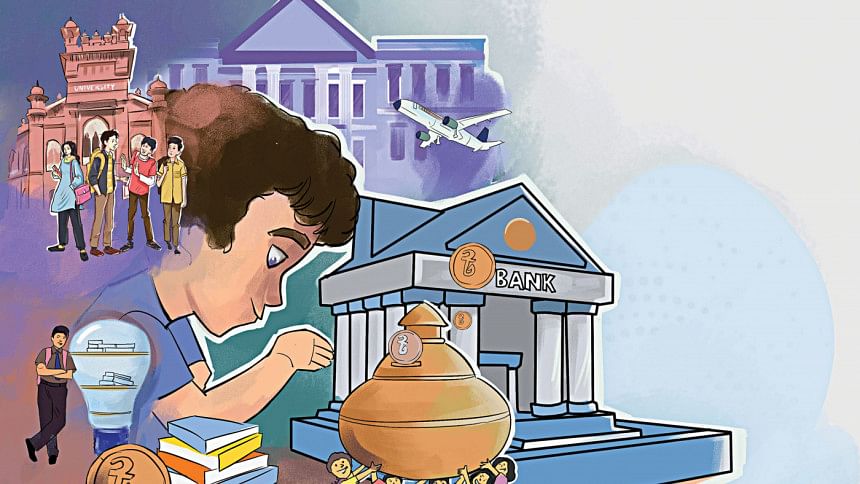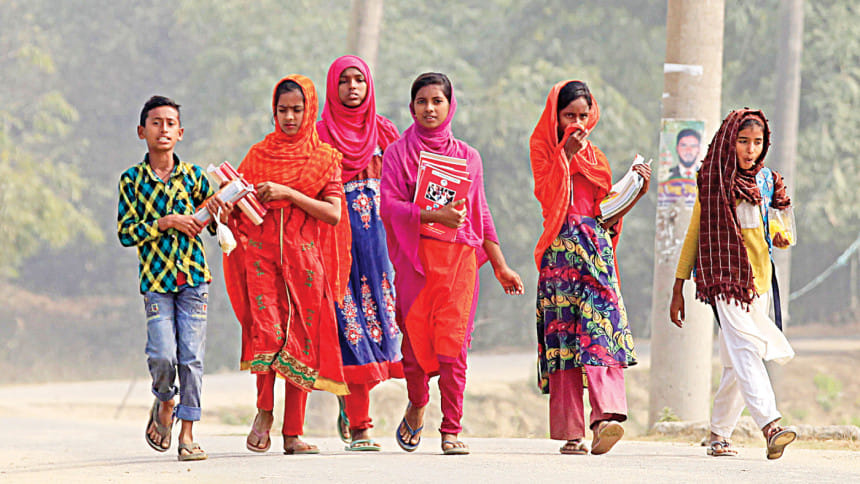Early Savers, future builders

School banking, a key financial inclusion initiative spearheaded by the central bank, has shown steady progress, as evidenced by the increasing number of accounts and the growing volume of deposits. Despite ongoing economic challenges, such as rising inflation, the nationwide popularity of school banking reflects the success of efforts undertaken by banks.
School banking plays a vital role in promoting financial inclusion, fostering savings habits from an early age, and advancing financial literacy. "Both at an individual level and within the broader family unit, school banking is crucial as micro- and macro-level economies are interconnected, particularly in terms of capital accumulation through savings," remarked Dr. Muhammad Shahadat Hossain Siddiquee, Professor of Economics at the University of Dhaka.
The initiative began in 2010, when Bangladesh Bank (BB) instructed all scheduled banks to introduce School Banking programmes, further strengthened by a comprehensive policy issued in October 2013. According to current guidelines, banks are authorised to open student accounts with a minimum deposit of BDT 100, free of service charges. This initiative aims to cultivate savings habits among students while introducing them to modern banking services and technologies. Since 2014, the central bank has also engaged in financial literacy campaigns to bring unbanked populations under the umbrella of formal financial services.
In alignment with Bangladesh Bank's directives, banks have adopted diverse strategies, including no-frill accounts, competitive interest rates, debit card services, financial education programmes, and student conferences, to introduce the younger generation to the banking system. As of March 2024, the School Banking programme encompasses 4.3 million accounts across the country, with total deposits amounting to Tk. 2,135 crore.
"Student banking programmes are pivotal for individual growth and national development, as they instil financial literacy, encourage a culture of savings, and promote responsible financial behaviour. A financially literate population makes informed decisions, leading to more efficient resource allocation and enhanced economic productivity," said Ali Reza Iftekhar, Managing Director and CEO of Eastern Bank Limited (EBL).
Bangladesh Education Statistics 2023 indicates that the education sector comprises 646,039 teachers and over 20 million post-primary students across 36,940 institutions. "Education serves as the foundation of a nation's progress, and these students are the driving force behind its future. From a macroeconomic perspective, fostering savings habits among students helps build national savings and investment, propelling long-term economic growth," noted Nazeem A. Choudhury, Deputy Managing Director of Prime Bank.+

A recent report from Bangladesh Bank highlights that Private Commercial Banks (PCBs) dominate the School Banking programme, holding 71.69% of the accounts and 79.90% of the deposits (amounting to BDT 19,231.75 million) as of the second quarter of 2024. The number of accounts and deposits grew by 3.60% and 11.26%, respectively, compared to the previous quarter.
"Many schools across the country have shown significant interest in partnering with banks to introduce financial education and savings initiatives to their students," commented Md. Ahsan-uz Zaman, Managing Director and CEO of Midland Bank.
Most banks have successfully implemented these programmes, achieving notable progress in expanding their outreach. Various campaigns, seminars, and events are organised annually to raise awareness among students and parents about the importance of maintaining a bank account.
"Financially literate individuals contribute to economic stability, reduced dependency on debt, and sustainable development. By fostering these habits early in life, we are not only empowering students for their future but also laying the groundwork for a more resilient and robust economy. Cultivating a savings mindset from an early age is essential for achieving sustainable growth in our country," stated Sheikh Mohammad Maroof, Managing Director of Dhaka Bank.
Highlighting the importance of the correlation between digitisation and the effectiveness of school banking, Mohammad Ali, Managing Director of Pubali Bank, remarked, "Academic institutions need to embrace automated systems to bridge the gap with the financial world. That's when school banking will truly take off. Recent campaigns, such as a digital booth in Chittagong, allow us to engage directly with students and their parents."

In line with Bangladesh Bank's guidelines, School Banking Accounts (SBAs) can be converted into general savings accounts once students turn 18, with approximately 87.93% of these accounts already transitioned. To further encourage savings among young people, banks have introduced schemes with minimal deposit requirements, enabling small monthly instalments to ensure nationwide accessibility.
Moreover, banks are incorporating digital features such as zero maintenance fees, free online banking, and Shari'ah-compliant options to attract younger customers. For instance, Islamic banks accounted for 26.23% of deposits and 28.24% of investments by March 2024, offering products like Midland Bank Saalam.
"By integrating students and their families into the formal banking system, these programmes reduce reliance on informal savings practices and strengthen the financial ecosystem. Empowering young individuals with financial literacy ensures they can make informed decisions, driving sustainable economic growth," said Ahsan Zaman Chowdhury, Managing Director of Trust Bank.
Students with school banking accounts during their academic life can access loan facilities of up to Tk 5 lakh in their own name under the Tk 500 crore refinancing scheme introduced by Bangladesh Bank. This loan can be utilised to purchase essential educational materials for higher education, supported by a repayment guarantee from their guardians.
School banking aspires to cultivate economically resilient generations while contributing to national progress. Beyond providing education loans, these programmes nurture entrepreneurial potential by offering loan options for business ventures to young account holders.
Despite notable progress, challenges remain, including significant disparities in deposit ratios across regions. As of June, total deposits in urban areas stood at 66.47%, while rural areas accounted for 33.53%.
"Undergraduates, particularly those in urban and semi-urban areas, are more inclined to open accounts under these schemes, demonstrating eagerness to learn about banking and financial management," noted Md. Ahsan-uz Zaman of Midland Bank.
On this subject, Dr. Shahadat Hossain of the University of Dhaka observed, "We need a comprehensive approach. It's not just about opening accounts but also about managing these accounts, encouraging savings, and finding ways to multiply those savings."
Rural areas are increasingly adopting school banking, aided by the proliferation of mobile banking and agent banking channels. Many guardians open accounts for their children and subsequently engage with the banking system themselves, thereby extending financial services to previously unbanked families, noted Md. Ahsan-uz Zaman.
This trend underscores the growing awareness and enthusiasm for financial literacy among young people. Enhanced collaboration between banks and educational authorities could propel this initiative to even greater success, benefiting students nationwide.

 For all latest news, follow The Daily Star's Google News channel.
For all latest news, follow The Daily Star's Google News channel. 



Comments